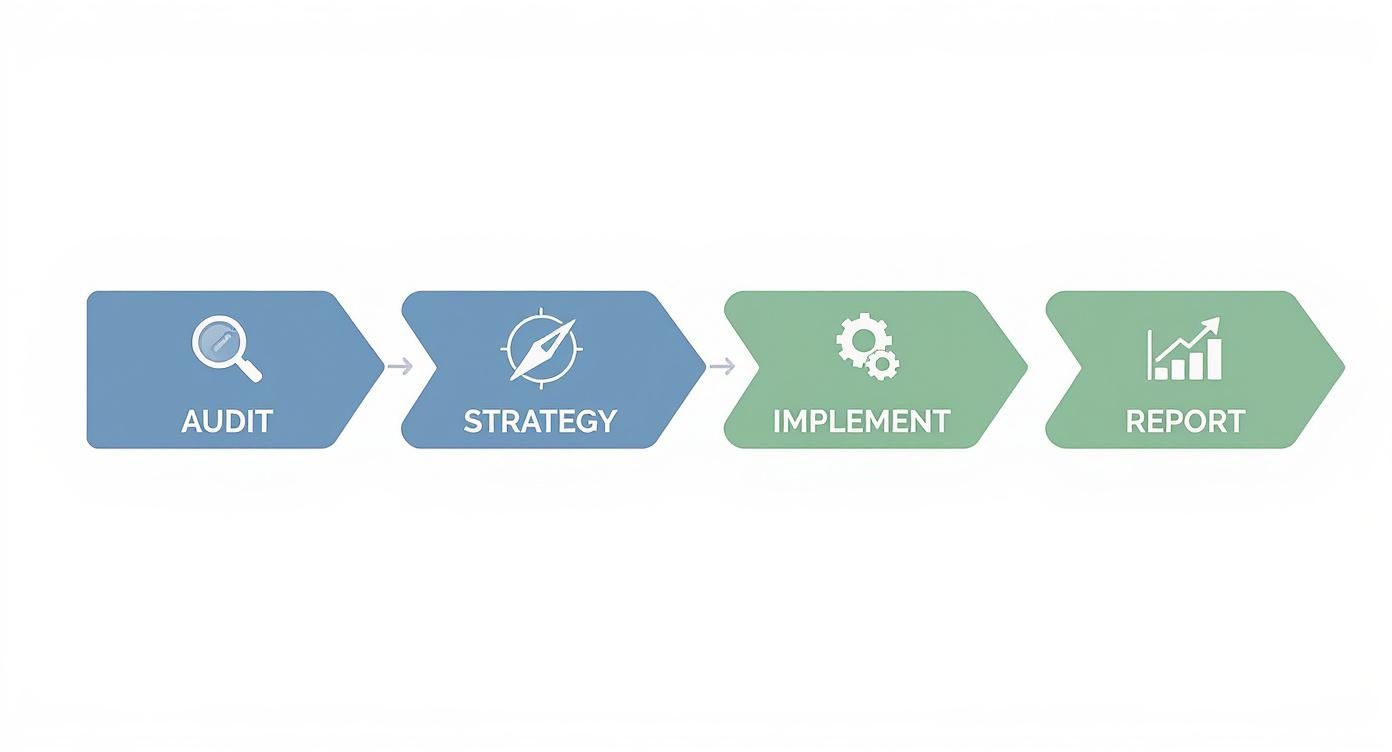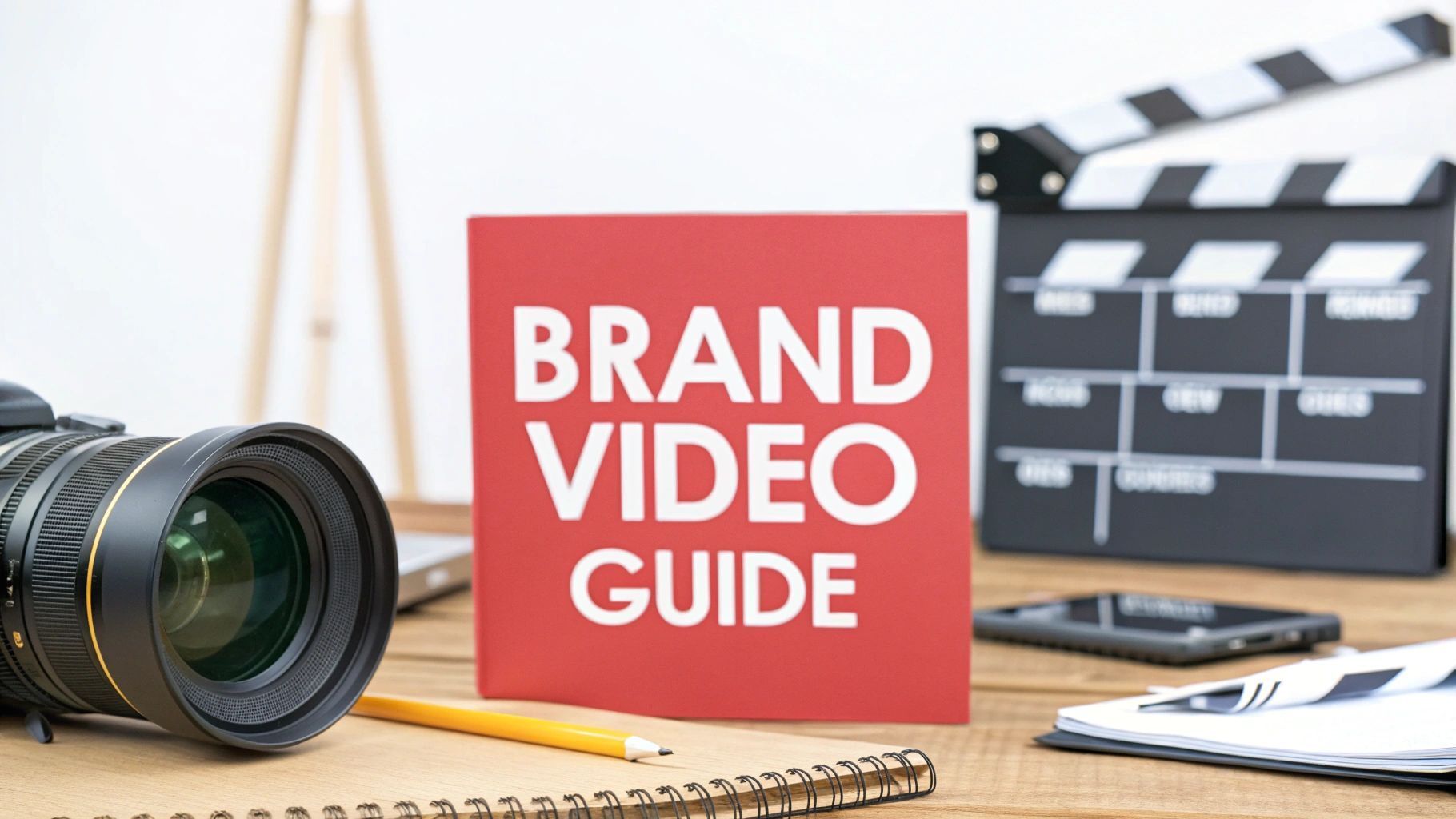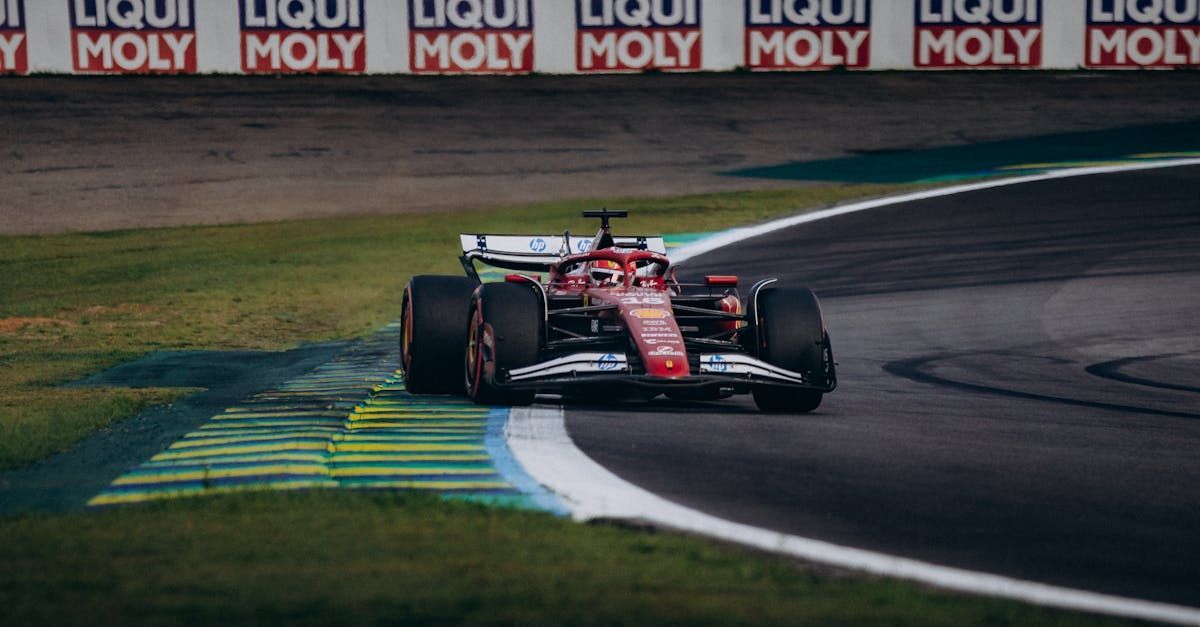organic search engine optimisation service: Your Guide
When we talk about an organic search engine optimisation service, what we're really talking about is earning your website a top spot on search engines like Google. It’s a world away from paid ads, which are essentially temporary rentals of online space. Instead, this is about building a lasting digital asset – one that pulls in customers who are actively looking for exactly what you offer, day in and day out.
The focus is squarely on generating real, sustainable traffic from people who want to be there, not just paying for clicks.
Understanding the Organic Search Engine Optimisation Service

Here’s a simple way to think about the difference. Paid ads are like renting a massive billboard on a busy motorway. You get a lot of eyes on you, sure, but the second you stop paying the rent, your billboard comes down and you vanish.
An organic search engine optimisation service , on the other hand, is like building an incredible reputation through pure word of mouth. It's the art and science of positioning your website as the single most relevant, trustworthy, and genuinely helpful answer to someone's search query. That earned trust is what gives you higher rankings that are far more stable and credible in the long run.
The Core Principle: Earning Visibility
At its heart, this whole process is about getting your website in sync with what search engines are built to do: give their users the best possible answers. It’s a long term game, all focused on proving your expertise and authority in your field. This involves a whole range of techniques that send strong signals to Google that your site deserves to be at the top.
The key goals of an organic SEO service really boil down to this:
- Building Credibility: By creating genuinely brilliant content and earning links from other respected websites, you build trust with both people and search engines.
- Improving User Experience: A fast, easy to use, and mobile friendly website isn't a 'nice to have' anymore. It's fundamental to keeping visitors happy and engaged.
- Attracting Relevant Traffic: The aim isn’t just getting more visitors; it’s about getting the right visitors – the ones who are actually looking for your products or services.
The ultimate aim of an organic SEO service is to establish your website as the go-to resource in your industry. This approach transforms your site from a simple online brochure into a powerful tool that consistently generates qualified leads and drives business growth.
This method takes patience and consistent effort, there’s no getting around that, but the payoff is huge. As you can find out in our comprehensive SEO overview , a well executed strategy creates a powerful, sustainable source of traffic that builds on itself over time. The return on investment completely eclipses what you’d get from short term ad campaigns.
The Four Pillars of an Organic SEO Strategy

A successful organic search engine optimisation service isn't just one thing; it's a coordinated effort built on four crucial pillars. Think of it like building a house. You need a solid foundation, strong walls, a reliable roof, and a well designed interior for it to be liveable and last for years. Miss one element, and the whole structure is compromised.
Each pillar in SEO supports the others, creating a powerful, unified strategy that drives real, long term results. Let’s break down how they all work together to get your website seen.
Technical SEO: The Foundation
This is the bedrock of your entire SEO strategy. Technical SEO is all about optimising the "behind the scenes" parts of your website so that search engines can find, understand, and index your content without hitting any roadblocks.
If your site is technically unsound, even the most brilliant content won't get noticed. It’s like writing a masterpiece of a book but locking it in a library with no doors and broken shelves – no one will ever read it. Technical SEO ensures your website is accessible and easy for search engine crawlers to navigate.
To get this groundwork right, have a look at our guide on technical SEO consulting as your blueprint for success.
On-Page SEO: The Walls and Structure
With a solid foundation in place, on page SEO comes next. This pillar focuses on optimising individual web pages by carefully crafting your content and HTML to signal relevance to both people and search engines. It’s about making it crystal clear what each page is about.
Key activities include:
- Keyword Research: Pinpointing the exact terms your ideal customers are typing into Google. A huge part of this is understanding keyword difficulty so you can target terms you can realistically rank for.
- Content Optimisation: Weaving your target keywords naturally into page titles, headings, and the main text to boost relevance.
- User Experience: Making sure your content is well structured, a breeze to read, and genuinely helps the person visiting the page.
Off-Page SEO: Your Reputation and Authority
Off page SEO covers all the actions taken outside your website to improve your rankings. This pillar is all about building your site’s authority, credibility, and trustworthiness across the web. The main way to do this? Earning high quality backlinks from other reputable websites.
A backlink is like a vote of confidence from one site to another. When a respected website links to you, it’s a signal to search engines that your content is valuable and trustworthy, which gives your authority a serious boost.
This isn’t about trickery; it’s about building relationships and creating content so good that other people want to talk about it and link to it.
Content Strategy: The Lifeblood
Content is the fuel that powers the entire SEO engine. A solid content strategy involves planning, creating, and sharing valuable and relevant content that attracts and keeps your target audience engaged. It’s the glue that holds all the other pillars together.
This goes way beyond just writing blog posts. It’s about creating a mix of assets—like in depth guides, case studies, or videos—that answer your audience’s questions and solve their problems.
Ultimately, brilliant content is what earns you backlinks, what makes your on page optimisation work, and what drives your organic visibility. With the top organic result on Google getting an average click through rate of 27.4% , it's clear how vital top ranking content is for bringing in traffic.
To help you visualise how these elements fit together, here’s a simple breakdown.
| Component | Main Focus | Key Activities |
|---|---|---|
| Technical SEO | Website accessibility and performance for search engines. | Site speed optimisation, mobile friendliness, XML sitemaps, fixing crawl errors. |
| On-Page SEO | Optimising individual page content and structure for relevance. | Keyword research, title tag optimisation, internal linking, creating quality content. |
| Off-Page SEO | Building authority and trust across the wider web. | Link building, brand mentions, social media signals, online reviews. |
| Content Strategy | Creating valuable assets that attract and engage the target audience. | Blog posts, guides, videos, case studies, infographics, topic cluster planning. |
Each pillar is essential. A technically perfect site with poor content won’t rank, and amazing content on a slow, broken site will never be seen. A truly effective organic SEO service ensures all four are working in harmony.
Why Investing in Organic SEO Pays Off
Choosing to invest in a professional organic search engine optimisation service is about more than just chasing rankings. It’s about building a powerful, sustainable growth engine that keeps delivering long after a paid ad campaign has been switched off.
Think of it like a prime property investment. The real value comes from creating a digital asset that actually appreciates over time, becoming more valuable the longer you hold it.
At its core, earning high organic visibility builds serious brand credibility. When a potential customer sees your website sitting proudly at the top of the search results, it’s a powerful endorsement from Google itself. This isn't just about traffic; it's about trust. People instinctively see organic results as more authentic and reliable than paid ads, positioning your business as an authority in its field.
Fuelling Sustainable Business Growth
Unlike paid ad campaigns, where the traffic stops the second you stop paying, organic SEO creates a continuous stream of high quality visitors. These aren't just casual browsers. They are people actively looking for the exact solutions, information, or products you offer.
This high level of intent means the traffic you get is inherently more qualified, leading to better leads and higher conversion rates. This steady flow of relevant traffic translates directly into a more predictable sales pipeline, which for any business in a competitive market like the UK, is the bedrock of scalable growth.
The real return from an organic SEO service isn't just in the immediate leads. It's in building a durable competitive advantage. You're creating an asset that works for your business 24/7, pulling in your ideal customers at the precise moment they need you.
Building a Long-Term Digital Asset
One of the biggest wins is the creation of lasting digital value. Every piece of optimised content, every quality backlink earned, and every technical fix adds to your website's overall authority.
This authority is cumulative; it snowballs over time and becomes incredibly difficult for your competitors to catch up to. Think of your website's authority as its reputation. The stronger it gets, the easier it becomes to rank for new keywords and attract even more traffic down the line, creating a positive feedback loop that cements your market position for years.
The Financial Sense of Organic SEO
While organic SEO requires an upfront investment, its long term cost effectiveness is undeniable, and the numbers back it up. For instance, a massive 53.3% of all website traffic in the UK comes from organic search, proving you can’t rely on paid ads alone.
What's more, 61% of B2B marketers say that SEO and organic traffic generate more leads than any other marketing initiative they run. It’s not just about visibility; it’s about business. You can dive deeper into more UK SEO statistics to get the full picture.
Ultimately, a well run organic SEO strategy delivers a far lower cost per acquisition over time compared to paid channels. It's not an expense; it’s a smart investment in the future profitability and stability of your business.
How a Typical Organic SEO Campaign Unfolds
Starting an organic search engine optimisation service can feel a bit like setting off on a long journey. You know where you want to go—higher rankings, more visitors, and a healthier bottom line—but the map can look pretty complicated.
In reality, though, a proper campaign follows a clear, logical path. It's a structured process that moves from deep dive analysis all the way through to constant, data backed improvement.
Think of it like building a bespoke home. You wouldn’t just start laying bricks without a detailed architectural plan. In the same way, a solid SEO campaign always kicks off with a comprehensive audit and consultation. This is where the experts get their hands dirty, digging into your website's current performance to find its strengths, expose its weaknesses, and uncover those hidden gems of opportunity. It's the groundwork that everything else is built on.
From that initial dig, a custom strategy is born. This is no one size fits all template; it's a specific roadmap crafted from meticulous keyword research and a hard look at your competition. The aim is to figure out exactly what your customers are typing into Google and how your rivals are trying to catch their attention. This allows the strategy to zero in on the most valuable turf for your business.
The infographic below shows how this all works in a cycle, moving from discovery to reporting and back again.

This really brings home the point that SEO isn’t a one and done task. It's a continuous loop of strategy, action, and smart adjustments.
Phase 1: The Initial Audit and Strategy
The whole campaign gets rolling with a thorough audit, which looks at three critical areas of your online presence. Any reputable organic search engine optimisation service will tell you this step is non negotiable.
- Technical Health Check: Is your website built in a way that Google can easily understand? This involves checking things like site speed, how it works on mobile phones, and fixing any broken links or errors that are holding it back.
- Content and On-Page Review: Does the stuff on your website actually answer your customers' questions and use the words they're searching for? This is all about assessing the quality, relevance, and structure of your pages.
- Off-Page Authority Analysis: What does the rest of the internet think of your website? Here, we look at your backlink profile to see who is linking to you, which tells us how authoritative your site is perceived to be.
With these findings in hand, a strategic plan is put together, setting out clear goals and the key performance indicators (KPIs) we’ll use to measure success.
Phase 2: Implementation and Optimisation
Once the plan is locked in, it’s time to get to work. This is the part where all those findings from the audit are turned into real fixes. Technical gremlins are squashed, on page elements like title tags and meta descriptions are sharpened, and existing content is polished to better match what people are searching for.
This stage is all about building a solid foundation for growth. It’s about creating a technically sound, perfectly optimised platform that’s ready for new content and authority building campaigns.
A successful SEO campaign is an iterative process. It involves making strategic changes, monitoring their impact, and then refining the approach based on real world data. It is a marathon, not a sprint.
Phase 3: Content Creation and Authority Building
With the technical house in order, the focus shifts to creating high quality, genuinely helpful content that pulls in your ideal audience. This could mean writing in depth blog posts, creating useful guides, or publishing articles that position your business as the go to expert in your industry.
At the same time, we start working on off page strategies to build your website's authority. This means earning high quality backlinks from other reputable websites. Think of these as "votes of confidence" in the eyes of search engines—they dramatically boost your credibility and, over time, your rankings.
Phase 4: Reporting and Continuous Refinement
Finally, a core part of any organic search engine optimisation service is transparent reporting. You should get regular, easy to understand updates on the metrics that matter, like organic traffic, keyword rankings, and conversion rates.
This data driven feedback loop is vital. It shows you what's working, proves the value of the investment, and helps us spot new opportunities to keep the campaign agile, effective, and always moving forward.
How to Measure Your SEO Success
So, you’ve invested in an organic search engine optimisation service. How can you be sure it's actually paying off?
True success isn’t just about watching your keyword rankings bounce around. It’s about tracking meaningful metrics that connect directly to your business’s bottom line, giving you a crystal clear picture of your return on investment.
Measuring success properly starts with identifying the right Key Performance Indicators (KPIs). Think of these as the vital signs for your SEO strategy; they're the hard numbers that show how effectively your efforts are hitting key business objectives. Without them, you're flying blind, unable to prove the value of your work or hold your provider accountable for real results.
Core Metrics for Tracking Performance
To get a true sense of how your campaign is doing, you need to focus on a handful of crucial KPIs that, together, tell the whole story. Each metric gives you a different piece of the puzzle, from how many people see you to how many become customers.
A few of the essentials include:
- Organic Traffic Growth: This is the big one. A steady, consistent rise in visitors coming from search engines is the most fundamental sign that your visibility is improving and you're attracting more potential customers.
- Click-Through Rate (CTR): This tells you what percentage of people who see your website in the search results actually click on it. A strong CTR means your page titles and descriptions are hitting the mark and grabbing people's attention.
- Keyword Ranking Improvements: While it's not the only thing that matters, tracking your position for key search terms is still vital. Climbing the rankings for commercially important keywords is a clear signal of progress.
Connecting SEO to Business Goals
At the end of the day, the only measure of success that truly matters is how your SEO activity is impacting your business goals. A solid organic search engine optimisation service should do more than just send visitors to your site; it should generate genuine business.
The real measure of SEO success isn't just about traffic volume; it's about traffic quality. It’s about attracting visitors who aren't just browsing but are ready to engage, enquire, and ultimately become customers.
This is where conversion tracking comes in. By setting up and monitoring actions like contact form submissions, phone calls, or product sales from organic visitors, you can draw a direct line from your SEO investment to actual revenue.
The numbers back this up. Research shows that SEO leads have a close rate of 14.6% , which dwarfs the 1.7% rate for outbound leads from things like cold calling. On top of that, SEO can slash the cost of getting a new lead by 61% compared to traditional methods. It's not just effective; it's efficient.
Another key area to watch is your website's overall authority online. Metrics like Domain Authority are a good indicator of your site's power and ability to rank. For a deeper dive into this, check out our guide on understanding the impact of Domain Authority on search rankings.
By keeping a close eye on these tangible business outcomes alongside the core SEO metrics, you can confidently prove the real world value your campaign is delivering.
Common Questions About Organic SEO Services
Dipping your toes into the world of organic search engine optimisation usually sparks a few questions. Before you commit, it’s only natural to want clear, straight answers to the things on your mind. Getting this clarity upfront helps set the right expectations and means you can partner with an agency in complete confidence.
One of the first things business owners ask is how organic SEO differs from paid ads, like Google Ads. The easiest way to think about it is this: paid search is like renting a billboard on a busy motorway – the second you stop paying, your ad disappears. Organic SEO, on the other hand, is like owning that billboard. It’s a long term asset that keeps delivering value, long after the initial work is complete.
How Long Does It Take to See Results?
This is probably the most common question we hear, and the answer isn't what everyone wants to hear: it takes time. Unlike the instant hit from a paid ad, organic SEO is a marathon, not a sprint. You’re building genuine trust and authority with search engines, not just buying a temporary spot at the top.
You’ll typically start to see some positive movement—think small ranking jumps and a slight uptick in traffic—within three to six months . But for the kind of significant, business changing results you’re really after, especially in a competitive field, you should be looking at a timeframe closer to six to twelve months. The first few months are all about laying the groundwork with technical fixes and content that will pay you back tenfold down the line.
How Are Organic SEO Costs Determined?
There’s no one size fits all price tag for an organic search engine optimisation service , as costs can vary quite a bit. That’s because every single business has different starting points and different goals.
The price really boils down to a few key things:
- Scope of Work: A local bakery has very different needs to a national e-commerce brand, and the scale of the campaign will reflect that.
- Competitiveness of Your Industry: If you’re trying to rank for highly sought after keywords, it’s going to require a lot more time and resources.
- Current Website Health: If your site is riddled with technical problems, there’s more initial heavy lifting needed to get it in good shape.
- Your Business Goals: If you’re aiming for aggressive growth, the investment will naturally need to be bigger to match those ambitions.
You have to stop thinking of SEO as a cost. It’s an investment. A properly run campaign builds a sustainable pipeline of qualified leads that just keeps growing, often becoming your most cost effective marketing channel.
Is Organic SEO Better Than Paid Search?
It’s not really an "either/or" situation. The smartest approach is often a blend of both. Organic SEO and paid search (PPC) are two different tools that work brilliantly together.
Organic SEO is your long game. It builds lasting authority, credibility, and a steady flow of "free" traffic over time.
Paid search gives you that instant visibility. It’s perfect for time sensitive promotions or for quickly testing out new keywords to see what sticks. The data doesn’t lie: research shows organic search drives 53% of all site traffic , while paid search is responsible for just 15%. PPC absolutely has its place, but a strong organic foundation is non negotiable for long term success. Using them in tandem creates a powerful combo, making sure you capture customers at every stage of their buying journey.
Ready to build a powerful, lasting digital asset for your business? At Superhub , we specialise in creating strategic organic SEO campaigns that deliver real, measurable growth. Discover how our expert services can elevate your brand's online presence.
Want This Done For You?
SuperHub helps UK brands with video, content, SEO and social media that actually drives revenue. No vanity metrics. No bullshit.



